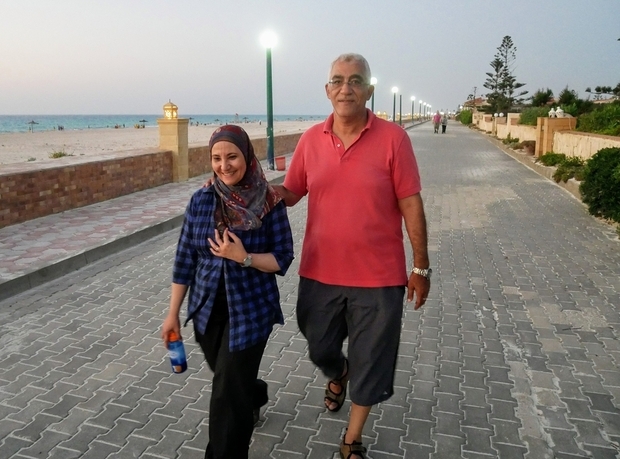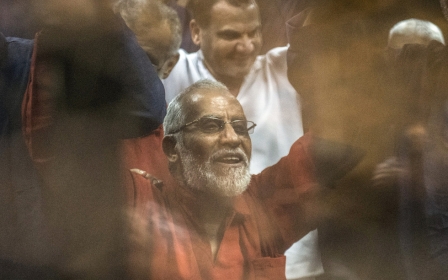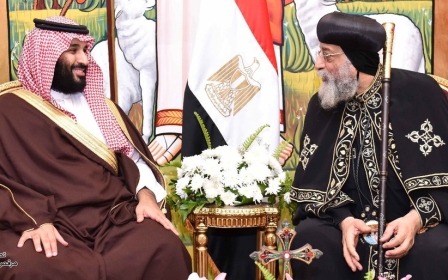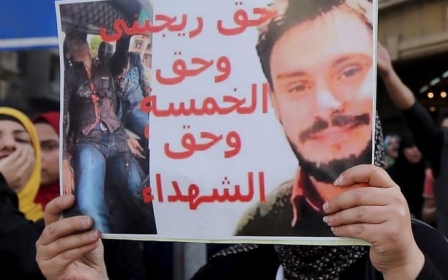Supporters of jailed Egyptian couple urge US Congress to 'act now'

Ola al-Qaradawi is losing hope as she remains in solitary confinement in Egypt without formal charges against her, or the prospect of freedom or a fair trial.
Qaradawi, who is the daughter of Qatar-based imam Youssef al-Qaradawi, was arrested along with her husband Hosam Khalaf in June 2017.
"There isn't enough pressure; we're never, ever getting out of here," she recently told her lawyer during a brief court appearance, according to her daughter Aayah Hosam.
Hosam, who lives in the northwestern US state of Washington, has started an email campaign to urge members of Congress to intervene for the release of her mother and father, who are US permanent residents.
The couple faces accusations of support for the Muslim Brotherhood, which has been blacklisted in Egypt since a 2013 military coup that toppled the country's first democratically-elected president, Mohamed Morsi.
But with no evidence or formal charges presented against them, leading rights organisations, including the UN Human Rights Council, have called for the release of Qaradawi and Khalaf.
The couple's supporters in the US have been lobbying lawmakers and the administration of US President Donald Trump to demand freedom for Qaradawi and Khalaf.
"The situation is dire and we need you to act now. Please take any steps that you can to free Ola and Hosam and reunite them with their children. Please raise concern with the Egyptian Ambassador to DC and request for their immediate release and improved conditions," a draft email addressed to various members of Congress, including senators on the Committee of Foreign Relations reads.
Aayah Hosam is urging Americans concerned about human rights to sign the electronic letter and send it in their own name.
"We started the email campaign, so people can help us out and show that they care," Hosam said.
The initiative intentionally coincides with the start of the discussion on the 2019 appropriations bill on foreign aid, she said.
The draft legislation, which was proposed in June, mentions the imprisoned couple by name, asking Secretary of State Mike Pompeo to consider their cases and urge "humane treatment" and fair trials for them.
'They do have the leverage'
Despite encouraging gestures from Congress, Hosam said the Trump administration is not pushing Cairo on human rights.
"I do believe that if the State Department and the administration really wanted to get this done, they do have the power to do so," Hosam told MEE, citing Washington's military aid to Cairo.
"They do have the leverage, but they're not using it the way they should," she added.
The White House appears to be heading for a clash with Congress over the murder of Washington Post columnist Jamal Khashoggi, with senior lawmakers accusing the administration of assisting in the cover-up to protect Saudi Crown Prince Mohammed bin Salman.
Trump's critics say the Saudi journalist's case embodies the president's disregard for human rights in his foreign policy.
Hosam said her parents' continued detention is related to the assassination of Khashoggi.
She added that she hopes the increased scrutiny on US allies' human rights records in the region will bring awareness to her parents' situation.
Qaradawi and Khalaf's family suspect that Egypt is detaining the couple as a part of its policies against Qatar. Less than a month before Hosam's parents were arrested, Cairo had joined Riyadh and its Gulf allies in imposing a blockade on Qatar.
Doha's alleged support for the Muslim Brotherhood has been a major sticking point in the diplomatic impasse. And imam Youssef Qaradawi had come to symbolise the Saudi-Egyptian charges against Qatar.
The 92-year-old Islamic scholar is often erroneously identified as the chairman of the Islamist group, but he has no official association with the Brotherhood.
Hosam said the Khashoggi case is an extreme example that shows how far Saudi Arabia and Egypt are willing to go to "reach what they want politically".
New MEE newsletter: Jerusalem Dispatch
Sign up to get the latest insights and analysis on Israel-Palestine, alongside Turkey Unpacked and other MEE newsletters
Middle East Eye delivers independent and unrivalled coverage and analysis of the Middle East, North Africa and beyond. To learn more about republishing this content and the associated fees, please fill out this form. More about MEE can be found here.




